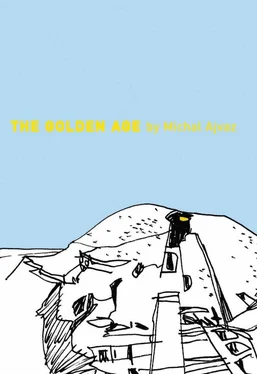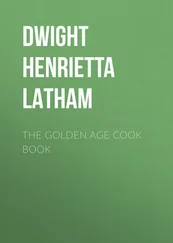Michal Ajvaz - The Golden Age
Здесь есть возможность читать онлайн «Michal Ajvaz - The Golden Age» весь текст электронной книги совершенно бесплатно (целиком полную версию без сокращений). В некоторых случаях можно слушать аудио, скачать через торрент в формате fb2 и присутствует краткое содержание. Год выпуска: 2010, Издательство: Dalkey Archive Press, Жанр: Современная проза, на английском языке. Описание произведения, (предисловие) а так же отзывы посетителей доступны на портале библиотеки ЛибКат.
- Название:The Golden Age
- Автор:
- Издательство:Dalkey Archive Press
- Жанр:
- Год:2010
- ISBN:нет данных
- Рейтинг книги:4 / 5. Голосов: 1
-
Избранное:Добавить в избранное
- Отзывы:
-
Ваша оценка:
- 80
- 1
- 2
- 3
- 4
- 5
The Golden Age: краткое содержание, описание и аннотация
Предлагаем к чтению аннотацию, описание, краткое содержание или предисловие (зависит от того, что написал сам автор книги «The Golden Age»). Если вы не нашли необходимую информацию о книге — напишите в комментариях, мы постараемся отыскать её.
is Michal Ajvaz’s greatest and most ambitious work.
The Golden Age
The Golden Age — читать онлайн бесплатно полную книгу (весь текст) целиком
Ниже представлен текст книги, разбитый по страницам. Система сохранения места последней прочитанной страницы, позволяет с удобством читать онлайн бесплатно книгу «The Golden Age», без необходимости каждый раз заново искать на чём Вы остановились. Поставьте закладку, и сможете в любой момент перейти на страницу, на которой закончили чтение.
Интервал:
Закладка:
And then it seems there was a long period when all such forces were asleep and the island’s script was frozen, after which came a new awakening and a time of even wilder transformation. Although in the days when I was on the island, a tendency towards a pictographic script was predominant, one could see many other tendencies dormant under the surface of their texts — some on the wane, some just being born. The islanders also had a kind of literature, of course, not least their Book (which I will get to presently, I trust), but I sometimes think that the story of the island’s script makes up a more interesting narrative than all the stories contained in their literary works.
The café on Rue des Beaux-Arts
The islanders’ letters were so restless that from time to time they produced a longing to pass out of the territory in which script is enclosed; indeed, they began to doubt where the border between script and non-script lay. And so it occurred that the script passed through stages in which it was impossible to say for sure whether its figures were still letters to be read or whether they should be looked at as pictures. And there were other times when the script cast into doubt a border more remote still, that which exists between symbol and object. The letters thought of their depth and accentuated this; they transformed themselves into three-dimensional forms that retained traces of the old life of the letter, but at the same time they were objects in which were born relations to places, to other objects and to certain purposes — which to begin with only glimmered through, but which later gradually established themselves and grew with their hosts. And in echoing this movement another movement was awakened; in the world of objects — in stones, in trees, in machines, in bodies — the germ of an ability to be a letter announced itself. This ability, which until now had kept its peace within, suddenly generated avenues of text, strange sentences which oddly enough were not entirely incomprehensible.
I had occasionally encountered in the cultures of Europe and Asia this fuzziness on the borders between letters and pictures, but the growing together of letters and objects is something known perhaps only to the inhabitants of the nameless island. I have heard only once of a similar fusion of letters and pictures in Europe, and this came in a story whose truth I have never been able to verify. It happened several years after my return from the island, at the Czech Centre in Paris’s Rue Bonaparte. I was present at the opening of an exhibition of the work of Josef Váchal, where I met a man of about sixty who came from Prague but had obviously lived for many years in Paris. We struck up a conversation at the buffet; it turned out that he was interested in Váchal’s wonderful typography. We went on to speak of the letter-pictures of Klee and Michaux and I was reminded of the script of the island. I mentioned that its letters occasionally release a yearning to transform themselves into objects. He considered this information before telling me that a friend of his in Paris, who had also been born in Prague, had experienced two incidents — one in his homeland and the other in Paris, each by different means — in which letters and pictures were in fusion. This was of considerable interest to me and I asked him to tell me about it. He said that it was a story long in the telling, and he invited me to accompany him to a small café that was just around the corner in Rue des Beaux-Arts.
Once the waiter had brought us our coffee, my new acquaintance began to tell me the story of his Parisian friend. Naturally my first thought was that he was employing the banal tactic of talking of himself in the guise of another, but it may have been so that — as in the famous Jewish joke about trains — he was speaking of someone else so I would believe he was speaking of himself while all the time he was speaking of a third person. Completing his studies in the mid-Sixties at Prague’s Faculty of Arts, the hero of the story began to work as a junior lecturer in the Department of Aesthetics. The narrator did not tell me his name, but let us call him Baumgarten. He began to write a book, because this was expected of a young academic. He chose its title somewhat at random; let us say it was “The Beauty of Nature in the History of Art and Aesthetics,” “Art and Society,” “The History of the Golden Ratio” or “Kant and Schiller.” By staying on at the university as a teacher after completion of his studies, above all he was able to prolong the life without roots of his student years, a life composed of many flaming and fading encounters with people, things, places and ideas. His world was restless, constantly entangling itself in and extricating itself from a web of academic, amicable, social and erotic ties, which transformed themselves from one to another and then evaporated.
After the purges of the Sixties they fired him from the university. But he did not end up as a boiler-man or a porter. He sat in the small offices of scientific institutes, in the light of flickering bulbs whose hum was a cheerless music that always came back to him when he remembered those years; he compiled biographies, wrote précis of papers and translated articles in periodicals, all of which they set down for him on the edge of his desk. The weave of his world, with its ongoing attachment to any situation, disintegrated, leaving behind it nothing but emptiness.
He attempted to fill this emptiness by continuing to work on his book, even though he knew that no one would publish it. He was surprised to discover that his work had embarked on a strange transformation. Now, in the theories on aesthetics which occupied his mind, no matter whether these took beauty to be the expression of an idea, life or formal ties, he saw remnant traces of an encounter with a terrible incident of some kind. Perhaps this was because he was having to learn to live with his new emptiness, that this woke in him an appreciation of slow motions, unnoticed rhythms and slight eddies. He saw in thoughts and gestures as well as in objects a trembling that until now he had never noticed. It was difficult to determine what this meant — not because the trembling resisted expression but because the concepts supposed to capture it stirred related, perhaps even identical vibrations, so that instead of performing the work accorded them, the concepts vibrated along with their subjects in a drunken round dance. Perhaps what was moving was some kind of larvae of being, the blind squirming, lashing out, twisting of being before the birth of something recognized, something named in the world, before the emergence of a thing; or else this was the convulsive twitching of nascent, crude time as it flowed into the body of things as the luminous fuel of their peregrinations across the landscapes of the world. These motions were rather repulsive to him; he felt himself to be looking into an aquarium dark and murky with slime, although there were also times when there was a radiant glow. Whether his feeling was one of disgust or delight, at any given moment these events were interesting to watch; Baumgarten told himself that this was not the worst amusement this wretched time could have found for him.
It seemed to him that the beauty he had read so many theories about, was nothing but this glow, a glow that was born in the midst of revulsion without ever quite accepting into itself that art was an endless, ever-transforming hymn about the soft, revolting germs of reality, an ode composed to themselves by the nameless white larvae of being. Sitting in his corner of the office he sometimes imagined himself presenting his superiors with an extract from the book he was writing and the expressions they would assume, and this fancy pulled his mouth into a grimace of amusement, which itself was a source of confusion among his colleagues.
Читать дальшеИнтервал:
Закладка:
Похожие книги на «The Golden Age»
Представляем Вашему вниманию похожие книги на «The Golden Age» списком для выбора. Мы отобрали схожую по названию и смыслу литературу в надежде предоставить читателям больше вариантов отыскать новые, интересные, ещё непрочитанные произведения.
Обсуждение, отзывы о книге «The Golden Age» и просто собственные мнения читателей. Оставьте ваши комментарии, напишите, что Вы думаете о произведении, его смысле или главных героях. Укажите что конкретно понравилось, а что нет, и почему Вы так считаете.












